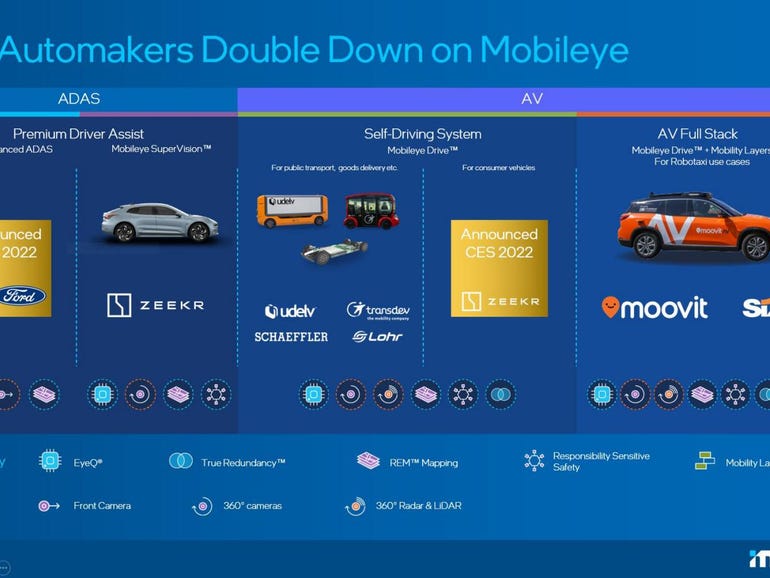Ahead of IPO, Intel’s Mobileye builds momentum with VW, Ford and Zeekr
Ahead of its IPO planned for later this year, Mobileye is touting a series of new deals with major auto companies like Volkswagen Group, Ford, and the global electric mobility technology brand Zeekr. Mobileye, an Intel-owned automated vehicle technology company, showcased its momentum this week at CES.
VW plans to globally deploy Mobileye’s crowd-sourced mapping data to improve features like lane-keeping assistance, making it the first automaker to globally apply the innovative “swarm data” for mapping. Ford, meanwhile, is deepening its strategic partnership with Mobileye in a number of ways. Among other things, the auto company plans to use Mobileye technology to deploy hands-free driving features in future cars. Zeekr plans to offer an all-electric self-driving car powered by Mobileye Drive by 2024.
Last month, Intel said it plans to hold an initial public offering for Mobileye in the US sometime in mid-2022. Mobileye originally became a publicly traded entity in 2014 before being acquired by Intel in 2017 for $15.3 billion. After the IPO, Intel will remain the majority shareholder in the company and will continue co-developing solutions for the automotive industry alongside it in the role of a strategic partner.
The new deal with Volkswagen will entail the broadest application yet of Mobileye Roadbook — a crowd-sourced, cloud-generated database of highly precise, high-definition maps. The crowd-sourced “swarm data” comes from Mobileye-equipped vehicles globally. VW is now using that data to improve its Travel Assist feature. For example, where available, lane-keeping assistance will be provided in many areas without visible lane markings. The Roadbook-enhanced Travel Assist feature will be available soon in Volkswagen, Škoda, and Seat electric vehicle (EV) models based on Volkswagen’s MEB platform.
“It’s a clear advantage of using real driving data over maps,” Dr. Herbert Diess, chairman of the board for Volkswagen Group, said after testing the new Travel Assist features. “Everything works well, and the car is basically following this car without any intervention from my side.”
Meanwhile, Mobileye is building on its long-standing relationship with Ford, which plans to add Road Experience Management (REM) mapping technology to a future version of Ford BlueCruise. With REM technology, drivers will be able to operate their vehicles hands-free while monitored by a driver-facing camera that can detect if the driver is not paying attention to the road ahead.
The automaker is also bringing Level 2-plus (L2+) hands-free advanced driver-assistance systems (ADAS) solutions across multiple makes and models. The two companies also are working together on an open platform from Mobileye that will allow Ford to build and integrate Ford’s own solutions.
Zeekr, part of the Geely Holding Group, also plans to use REM mapping technology in new electric vehicles. It also plans to enable Level 4 autonomy with Mobileye True Redundancy sensing and a Responsibility-Sensitive Safety (RSS)-based driving policy. The vehicle’s consumer debut is expected by 2024 in China, with a global rollout to follow.




